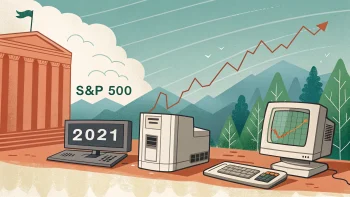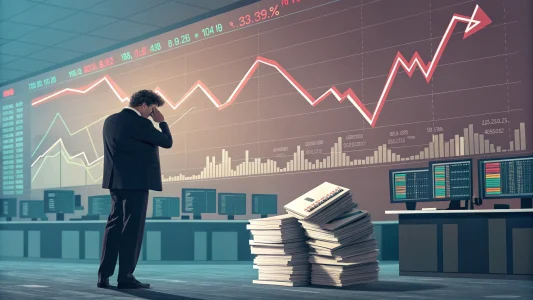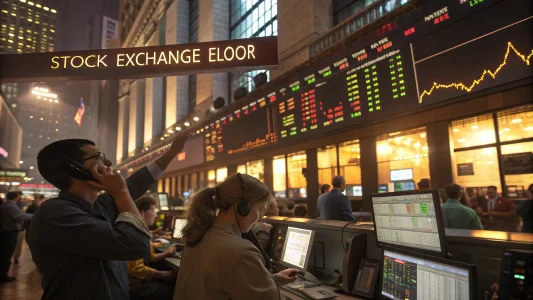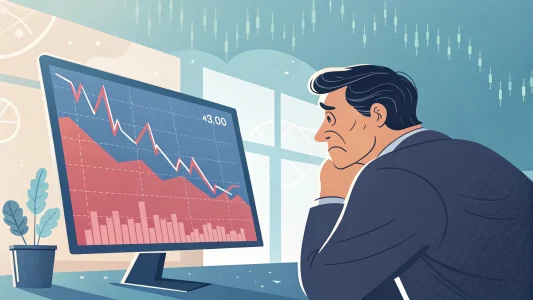Market crashes can be terrifying for investors, but they also present unique opportunities for those willing to take a strategic approach. Recently, I watched Steve Chen from CALLTOLEAP share his top investment picks during this last volatile period, and his insights offer a compelling perspective on navigating market downturns.
As someone who’s weathered several market corrections, I believe Chen’s approach makes sense — focusing on established companies with strong fundamentals rather than chasing speculative investments. His selection combines retail giants, tech leaders, and dividend-focused ETFs that could potentially weather economic storms.
Table of Contents
ToggleWhy These Particular Investments Stand Out
Chen’s first two picks – Amazon and Alphabet (Google) — represent tech giants with diversified revenue streams and dominant market positions. These companies have demonstrated resilience during previous downturns and continue to innovate across multiple sectors. Their massive cash reserves also provide buffers against extended economic challenges.
What impressed me about Chen’s list was his inclusion of Waste Management – a company that provides essential services regardless of economic conditions. This defensive stock choice shows a thoughtful approach to building a crash-resistant portfolio.
The retail selections – Costco and Walmart – also make strategic sense during uncertain times:
- Both companies sell essential goods that consumers need regardless of economic conditions
- Their discount-focused business models typically perform well during recessions
- They have established supply chains and a significant market share
These retail giants often demonstrate counter-cyclical strength when consumers become more price-conscious during economic downturns.
View this post on Instagram
ETF Selections for Broader Exposure
The ETF choices Chen highlighted complete his strategy with broader market exposure:
- SPLG (SPDR Portfolio S&P 500 ETF) — Low-cost exposure to large-cap U.S. stocks
- QQQM (Invesco NASDAQ 100 ETF) — Access to major tech companies with lower fees than QQQ
- SCHD (Schwab U.S. Dividend Equity ETF) — Focus on quality dividend-paying companies
I particularly appreciate the inclusion of SCHD, as dividend-focused investments can provide income streams even when market prices decline. This balanced approach combines growth potential with income generation.
In the end, this is what I’m comfortable with investing in,” Chen noted, highlighting an important principle – investing should align with your personal risk tolerance and financial goals.
My Take on Market Timing
While I agree with Chen’s selections, I want to emphasize that trying to perfectly time market bottoms is nearly impossible. Instead of waiting for the “perfect” moment, consider dollar-cost averaging into quality investments during downturns. This approach removes the psychological pressure of timing the market while potentially lowering your average purchase price.
Market crashes have historically presented excellent buying opportunities for long-term investors. Looking back at the 2008 financial crisis, COVID-19 market crash, and other corrections, those who continued investing in quality companies during downturns generally saw substantial returns over time.
As a former teacher himself, Chen brings an educator’s perspective to investing, making complex concepts accessible. His background reminds us that successful investing doesn’t require a finance degree — it requires patience, discipline, and a willingness to learn.
Building Your Crash-Resistant Portfolio
If you’re considering building your own portfolio during this volatile period, I recommend starting with a few key principles:
- Focus on companies with strong balance sheets and competitive advantages
- Diversify across sectors that perform differently during economic cycles
- Consider your time horizon — longer investment periods can help weather volatility
- Only invest money you won’t need for immediate expenses
Remember that market downturns are standard parts of economic cycles. While they can be uncomfortable, they also create opportunities for patient investors to acquire quality assets at discounted prices.
The next time you see alarming headlines about market crashes, consider Chen’s approach – looking for quality investments rather than panicking. Market volatility is inevitable, but how we respond to it often determines our long-term investment success.
















